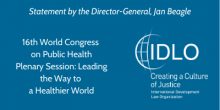East and Horn of Africa Paralegals Network (EAHPN) Annual Forum
Paralegal networks play a critical role in establishing a link between the informal and formal justice systems in the East and Horn of Africa.


Rights mean little if those entitled to them are not aware they exist. Due process is of doubtful value when you are illiterate, or unable to understand the proceedings. Courts are next to worthless for those who cannot afford the bus fare to reach them. Nor should justice be about courts alone. For all these reasons, legal empowerment is crucial. Part of IDLO's bottom-up (or demand side) approach, it involves equipping people with the knowledge, confidence and skills to realize their rights. Even as we work to improve the functioning of justice systems, we strengthen citizens' capacity to press for justice from below.
The rule of law only exists to the extent that it works for all.
Paralegal networks play a critical role in establishing a link between the informal and formal justice systems in the East and Horn of Africa.

World Justice Challenge Webinar Event | 16 December 2020 | 16:00 – 17:00 CET
Access to Justice for All and the COVID-19 Pandemic: Recommendations for Action

Sound legal and policy frameworks are key enablers in ensuring effective prevention, detection, and response to Public Health Emergencies of International Concern and other public health risks. The International Health Regulations, developed in 2005, is a legally binding instrument requiring States to develop core capacities for rapid detection of and response to public health emergencies such as COVID-19.
Professor Signorelli, Dr Azzopardi Muscat, fellow panelists and distinguished Congress delegates,
It is a great pleasure to address the 16th World Congress on Public Health.

IDLO is rolling out a program that aims to secure accessible, quality and sustainable justice services for citizens - particularly those living in rural, poor and other disadvantaged communities. The Community Justice Programme (CJP) supports both state and non-state legal aid, legal empowerment and other justice delivery interventions.
Court Annexed Mediation was rolled out in Mombasa for the Tononoka Children’s Court. The project, led by the Alternative Dispute Resolution Task Force of the Kenyan Judiciary, and supported by IDLO, will set an example for the rest of the country on how Mediation enhances access to justice for children and offer protection for children within the justice systems.
Disclaimer: This event was organized at the beginning of March 2020, before the Kenyan Government put in place restrictions to protect the population from the global Covid-19 pandemic.
43rd Session of the Human Rights Council: High-level Panel Discussion Commemorating the Twenty-Fifth Anniversary of the Beijing Declaration and Platform for Action Adopted at the Fourth World Conference on Women
STATEMENT OF THE INTERNATIONAL DEVELOPMENT LAW ORGANIZATION
Room XX, Palais des Nations, Geneva

SIDE EVENT Women Delivering Justice: What's Next for SDG 16.7 and Women Justice Professionals





|
Policy Statements
|